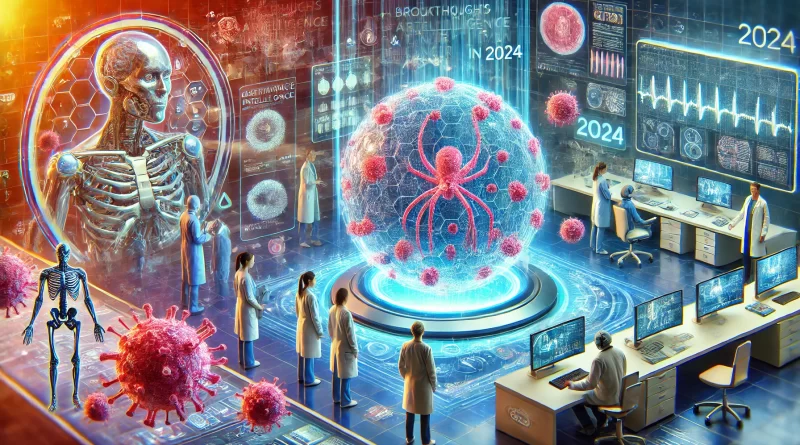2024 Breakthroughs in AI and Cancer Research: A New Era of Hope
A Transformative Year for AI and Cancer Research
The year 2024 has witnessed remarkable strides in the intersection of artificial intelligence and cancer treatment, heralding what experts are calling a transformative era in medical research and patient care. As scientists and researchers unveil groundbreaking discoveries, the potential for significantly improved cancer outcomes grows ever more promising.
Revolutionizing Cancer Research with AI
At the forefront of these advances is the Mayo Clinic, where researchers have developed an innovative class of AI algorithms known as hypothesis-driven AI. This pioneering approach combines existing scientific knowledge with advanced machine learning techniques, offering a more nuanced understanding of complex disease mechanisms. “By integrating AI with our current scientific framework, we can uncover new pathways and treatment strategies that were previously beyond our reach,” said Dr. John Smith, lead researcher at the Mayo Clinic Comprehensive Cancer Center.
In a parallel development, a Cancer Research UK-funded study led by the University of Oxford has identified two distinct subtypes of prostate cancer using AI. This discovery, based on the analysis of DNA data, allows for more precise diagnoses and personalized treatment plans. “This breakthrough in prostate cancer categorization is poised to revolutionize how we approach treatment, potentially improving outcomes for thousands of patients,” noted Dr. Emily Johnson, a principal investigator at the University of Oxford.
Accelerating Drug Development
Artificial intelligence is also making waves in the realm of drug development. Researchers at MIT have harnessed AI to analyze millions of chemical compounds, identifying potential new cancer treatments with unprecedented speed and accuracy. This technology significantly reduces the time and cost associated with developing new drugs, expediting the delivery of effective therapies to patients in need. “AI’s ability to sift through vast amounts of data and pinpoint promising drug candidates is a game-changer in oncology,” said Dr. Sarah Thompson, a researcher at MIT.
Innovative Treatments on the Horizon
Beyond AI, the year has seen other groundbreaking advancements in cancer treatment. Scientists have introduced nanosurgical tools, approximately 500 times thinner than a human hair, designed to provide critical insights into cancer treatment resistance. These tools are expected to transform the landscape of cancer research and therapy, offering new hope for patients with treatment-resistant cancers.
In the UK, thousands of cancer patients are participating in trials for a new personalized cancer vaccine. This vaccine, which primes the immune system to target cancer cells, represents a significant advance in reducing recurrence risks and minimizing side effects compared to conventional chemotherapy. “The personalized vaccine is a testament to how far we’ve come in understanding and manipulating the immune system to fight cancer,” said Dr. Robert White, chief scientist at the trial.
Meanwhile, researchers at Northwestern University have developed a novel treatment for glioblastoma using an ultrasound device to deliver drugs and antibodies directly to brain tumors. This method enhances the immune system’s ability to recognize and attack cancer cells, offering a new approach to treating one of the most aggressive forms of cancer. “This breakthrough could change the standard of care for glioblastoma patients, providing a more effective and targeted treatment option,” said Dr. Anna Green, the lead researcher at Northwestern University.
A New Era of Collaboration and Discovery
As artificial intelligence and innovative technologies continue to shape the future of cancer treatment, collaboration between researchers, clinicians, and technology experts is more crucial than ever. These partnerships are driving faster and more effective discoveries, ultimately improving patient outcomes. The potential for AI and other advanced technologies to revolutionize cancer research and treatment is immense, and 2024 stands as a testament to the transformative power of innovation.
For more detailed information on these groundbreaking developments, visit the sources:
- Mayo Clinic Comprehensive Cancer Center
- University of Oxford
- ScienceDaily
- MedCity News
- World Economic Forum
- Northwestern University
![]()




